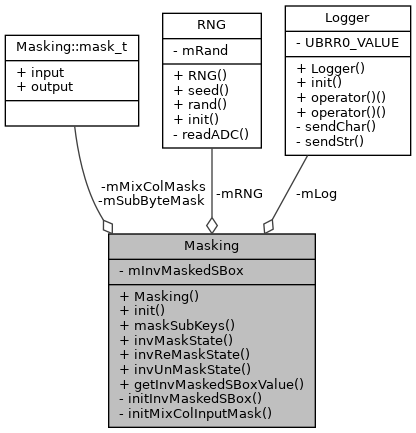Masking class that provides functionality for masking and unmasking AES-decryption. More...
#include <masking.h>

Classes | |
| struct | mask_t |
| Structure for masks. Masks always come in pairs, with an input & output mask. More... | |
Public Member Functions | |
| Masking ()=default | |
| Construct a new Masking object. | |
| void | init () |
| Initialize the masks & the masked inverse S-Box. More... | |
| void | maskSubKeys (const sub_keys_t subKeys, sub_keys_t maskedSubKeys) const |
Mask the subKeys & store the masked keys in maskedSubKeys. More... | |
| void | invMaskState (state_t state) const |
| (Inverse) mask the state before the first AddRoundKey step. More... | |
| void | invReMaskState (state_t state) const |
| (Inverse) re-mask the state after every MixCol step. More... | |
| void | invUnMaskState (state_t state) const |
| (Inverse) un-mask the state after the last AddRoundKey step. More... | |
| uint8_t | getInvMaskedSBoxValue (const uint8_t index) const |
| Get a value of the (inverse) masked S-Box at a specific index. More... | |
Private Member Functions | |
| void | initInvMaskedSBox (uint8_t maskedSBox[], const mask_t &subByteMask) const |
| Compute the (inverse) masked S-Box. More... | |
| void | initMixColInputMask (mask_t mixColMasks[]) const |
| Compute masks m_i, i=1..4, by performing a MixCol operation on masks m_i'. More... | |
Private Attributes | |
| uint8_t | mInvMaskedSBox [SBOX_BYTES] |
| Inverse S-Box with masked values. | |
| mask_t | mSubByteMask = {} |
| SubByte input & output mask. More... | |
| mask_t | mMixColMasks [4] = {} |
| 4 MixCol input & output masks. More... | |
| RNG | mRNG |
| Random-Number-Generator. | |
| Logger | mLog |
| Logger. | |
Detailed Description
Masking class that provides functionality for masking and unmasking AES-decryption.
The masking techniques used here are strongly based on the work presented by Mangard, Oswald & Popp in their book "Power Analysis Attacks: Revealing the Secrets of Smart Cards". The implementation presented on pp. 228 ff. for encryption was adjusted to fit the decryption that was implemented here.
- Date
- 28.06.2022
- Copyright
- Philipp Karg 2022
Member Function Documentation
◆ getInvMaskedSBoxValue()
|
inline |
Get a value of the (inverse) masked S-Box at a specific index.
- Parameters
-
[in] index (const uint8_t): Index to get value for.
- Returns
- (uint8_t): The value at
index.
◆ init()
| void Masking::init | ( | ) |
Initialize the masks & the masked inverse S-Box.
- Seed the Random-Number-Generator.
- Create random m & m' masks.
- Create the masked inverse S-Box, by calling initInvMaskedSBox().
- Create random masks m_i', i=1..4.
- Calculate the corresponding masks m_i, i=1..4 by calling initMixColInputMask().
◆ initInvMaskedSBox()
|
private |
◆ initMixColInputMask()
|
private |
Compute masks m_i, i=1..4, by performing a MixCol operation on masks m_i'.
- See also
- "Power Analysis Attacks" by Mangard et. al. p. 228 ff.
- Parameters
-
[in,out] mixColMasks ( mask_t): Masks m_i & m_i'.
◆ invMaskState()
| void Masking::invMaskState | ( | state_t | state | ) | const |
(Inverse) mask the state before the first AddRoundKey step.
XOR the state with (m_i' ^ m ^ m'), i=1..4.
- See also
- "Power Analysis Attacks" by Mangard et. al. p. 228 ff.
- Parameters
-
[in,out] state ( state_t): State to be masked.
◆ invReMaskState()
| void Masking::invReMaskState | ( | state_t | state | ) | const |
(Inverse) re-mask the state after every MixCol step.
XOR the state with (m_i ^ m'), i=1..4.
- See also
- "Power Analysis Attacks" by Mangard et. al. p. 228 ff.
- Parameters
-
[in,out] state ( state_t): State to be re-masked.
◆ invUnMaskState()
| void Masking::invUnMaskState | ( | state_t | state | ) | const |
(Inverse) un-mask the state after the last AddRoundKey step.
XOR the state mit m_i', i=1..4.
- See also
- "Power Analysis Attacks" by Mangard et. al. p. 228 ff.
- Parameters
-
[in,out] state ( state_t): State to be un-masked.
◆ maskSubKeys()
| void Masking::maskSubKeys | ( | const sub_keys_t | subKeys, |
| sub_keys_t | maskedSubKeys | ||
| ) | const |
Mask the subKeys & store the masked keys in maskedSubKeys.
XOR the original keys with masks (m_i' ^ m), i=1..4.
- See also
- "Power Analysis Attacks" by Mangard et. al. p. 228 ff.
- Parameters
-
[in] subKeys (const sub_keys_t): Original sub-keys to be masked. [out] maskedSubKeys ( sub_keys_t): Masked sub-keys.
Member Data Documentation
◆ mMixColMasks
|
private |
4 MixCol input & output masks.
In "Power Analysis Attacks" by Mangard et. al. p. 228 ff., the MixCol input masks are noted as m_i, while the output masks are noted as m_i', where i=1..4.
◆ mSubByteMask
|
private |
SubByte input & output mask.
In "Power Analysis Attacks" by Mangard et. al. p. 228 ff., the SubByte mask input mask is noted as m, while the output mask is noted as m'.
The documentation for this class was generated from the following file:
 1.8.17
1.8.17